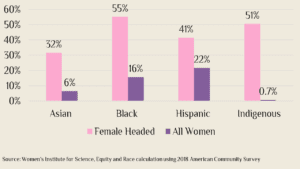Yesterday, I spent time with my little friend, Kaylee. It was her sister’s first day of online school, and Kaylee didn’t want to be a distraction. Kaylee attends school in a different district, and the first day of school for older children, 3rd graders and above is today.
Kaylee and I did a bit of shopping for office supplies and fashion. She had some strong opinions about my fashion choices. Needless to say, there were a few items that I didn’t purchase.
Kaylee’s parents are like millions of working parents with school-age children that will need the support of their social networks during this pandemic. And although the needs will be different, families across the income distribution will need assistance.
Low-wage parents and single-parent households are likely to require the most assistance.
Forty-seven percent of women in the labor force with children between the age of 6 and 17 are Asian, Black, Hispanic, Indigenous American, or Multiracial women. At least one-third of the women in each of these race/ethnic groups is head of household. Even if these mothers can work from home, they are less likely to have another adult to assist with a child’s schoolwork, which would allow them to complete tasks for their job.
Table 1. Working Mothers by Household Status and Race/Ethnicity

There is also a shortage of computers, which puts more strain on district and family resources. Couple this with the likelihood that these families are either in poorly resourced school districts or may not have money to buy a computer, and a mother’s stress level is exacerbated.
It is our responsibility to offer help, not wait to be asked.
While we often focus on low-wage and single-parent households, it is flawed to assume that parents with more financial resources will not need support. These parents may need a tutor to lead a learning pod. This is an opportunity to connect these parents with retired educators, recent graduates, or others unemployment due to the pandemic and qualified to assist with instruction.
If you don’t view helping parents with resources to find a tutor a social concern, I’d ask that you shift your focus to the millions unemployed or underemployed due to the pandemic. Employment as a tutor may allow many to take care of their families.
That said, we must also be vigilant that those employed to lead learning pods or assist with micro-schools are not exploited or put at risk of contracting COVID-19.
And Yes, I am concerned about how learning pods and micro-schools may widen the achievement gap.
Over the next few weeks, I ask that you find ways to help a family with children have an excellent start to what is likely to be a challenging school year.
Best,
Rhonda


